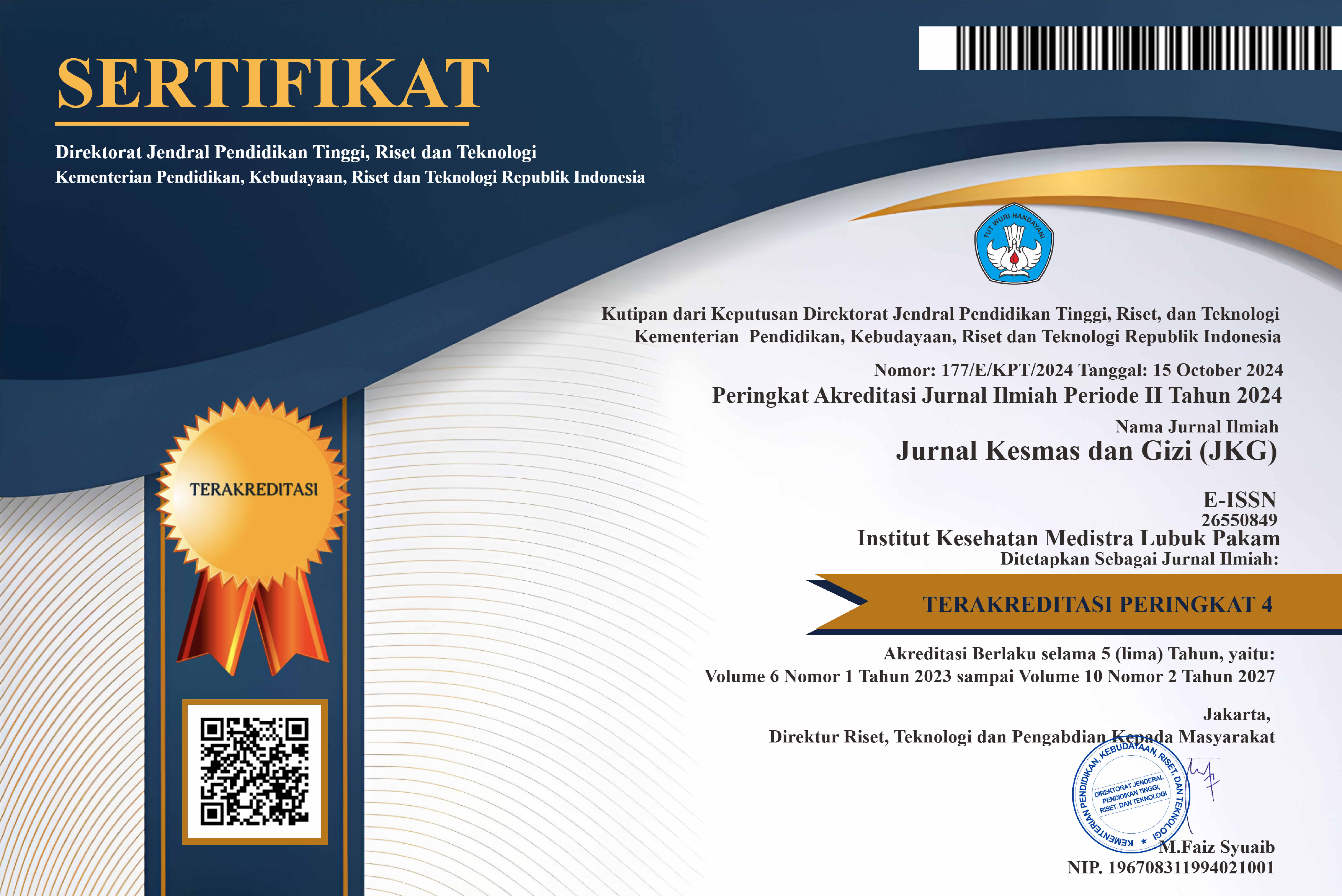Analysis of Hydroquinone Compounds in Whitening Body Lotion Preparations Circulating in The Community
DOI:
https://doi.org/10.35451/jkg.v6i2.2123Keywords:
Hydroquinone, UV-Vis Spectrophotometer, TLC, Whitening Body Lotion.Abstract
Skin care has become an important part for today's women. Whitening body lotion is very necessary in maintaining skin when doing activities outside and indoors. Many Indonesian women desire to have white, clean and bright skin so they can appear attractive. An attractive appearance is very necessary in society. To achieve this, many women choose skin care products at affordable prices without paying attention to the dangers of the chemical content in them. One of the skin whitening ingredients that is often used in beauty products is the compound hydroquinone. The hydroquinone compound plays a role in preventing skin pigmentation. However, if the levels exceed 0.02% in the preparation, it will cause skin irritation, kidney function disorders and cancer. The type of research is a mixed type, namely qualitative and quantitative. Qualitatively, it will obtain data on the presence of hydroquinone and quantitatively in the form of hydroquinone levels. The samples were 5 whitening body lotion preparations circulating in Lubuk Pakam which were determined randomly and were coded A, B, C, D, and E. Qualitative analysis was carried out using the TLC method and quantitative analysis was carried out using the UV-spectrophotometric method. Visible. The results of qualitative analysis show that samples A, C, and D contain hydroquinone compounds which are characterized by the appearance of blackish brown spots with respective Rf values of 0.89; 0.96; and 0.89. Meanwhile, when qualitative analysis was carried out, the levels obtained for the three samples were 44.56% each; 5,604%; and 5,612%. Based on regulations issued by BPOM RI in 2022, it is stated that hydroquinone levels in beauty products must not exceed 0.02%. So it can be concluded that whitening body lotion preparations with sample codes A, C, and D are not recommended for use because the use limit for hydroquinone is classified as unsafe. It is recommended that people, especially women, be more selective in choosing and using beauty products.
Downloads
References
Adriani, A., dan Safira, R. (2018). Analisa Hidrokuinon dalam Krim Dokter secara Spektrofotometri UV-Vis. Lantanida Journal.
Ari S.C, Eva S.S, Rani D.P. 2019. Analisis Merkuri dan Hidrokuinon pada Krim Pemutih yang Beredar di Jayapura. Journal Vol.8 No.1 P-ISSN: 2303-3142, Program Studi Farmasi,Universitas Cendrawasih, Papua.
Elferjani, H.S, Ahmida, N.H.S, and Ahmida, A. 2017. Determination of hydroquinone in some pharmaceutical and cosmetic preparation by spectrophotometric method, International Journal of Science and Research (IJSR), 6(7): 2219-2224.
Feladita, N., Saputri, G. A. R., & Puspita, L. (2016). Identifikasi dan Penetapan Kadar Hidrokuinon dalam Krim Malam pada Empat Klinik Kecantikan di Bandar Lampung dengan Menggunakan Metode Kromatografi Lapis Tipis dan Spektrofotometri UV-Vis. Jurnal Analis Farmasi, 1(3), 135-143.
Irnawati, Sahumena, M.H., dan Dewi, W. O., 2016, Analisis Hidrokuinon pada Krim Pemutih Wajah dengan Menggunakan Spektrofotometri UV-Vis. Jurnal Ilmiah Farmasi UNSRAT: Pharmacon.
Pamungkas. (2016). Perancangan VIdeo Iklan " Natural Honey Hand And Body Lotion" Bagi Wanita Indonesia. J Desain Komus Vis.
Rohman, A (2014) Statistika dan Komentrika Dasar dalam Analisis Farmasi. Pustaka pelajar, yogyakarta, Hal, 59,67, JOUR.
Rubiyanti, R., & Setiwan,A (2018). Pengaruh Pemberian Hidrokuinon Terhadap Fetus Mencit (Mus musculus L) Swiss webster. Jurnal Akademika Baiturrahim Jambi, 5 (1), 1-13. JOUR.
Sarah, K.W., 2014, Analisis Hidrokuinon dalam Sediaan Krim Malam Cw 1 dan Cw 2 Dari Klinik Kecantikan N dan E di Kabupaten Sidoarjo, Jurnal Ilmiah Mahasiswa Universitas Surabaya, Vol 3, 1-27
Siyaka,L; Joda, AE; Yesufu, HB; Akinleye, MO; 2016, Determination of hydroquinone content in skinlightening creams in Lagos, Nigeria,The Pharma Innovation Journal.
Windiyati dan Mayasari T. 2019. Perawatan Kecantikan Kulit, Panduan Lengkap Perawatan Estetika Kulit Wajah. PT. Gramedia Pustaka Utama; Jakarta.
Yuliani, N.Y., dan Djou, S.W. 2014, Identifikasi Hidrokuinon dalam Krim Pemutih dengan Metode Kromatografi Lapis Tipis (KLT), Jurnal Info Kesehatan, Vol 13, 767-771.
Downloads
Published
Issue
Section
License
Copyright (c) 2024 Jhon Patar Sinurat, Miftahul Husna, Reh Malem Br Karo, Aminah Syarifuddin

This work is licensed under a Creative Commons Attribution 4.0 International License.
Copyright in each article is the property of the Author.



























